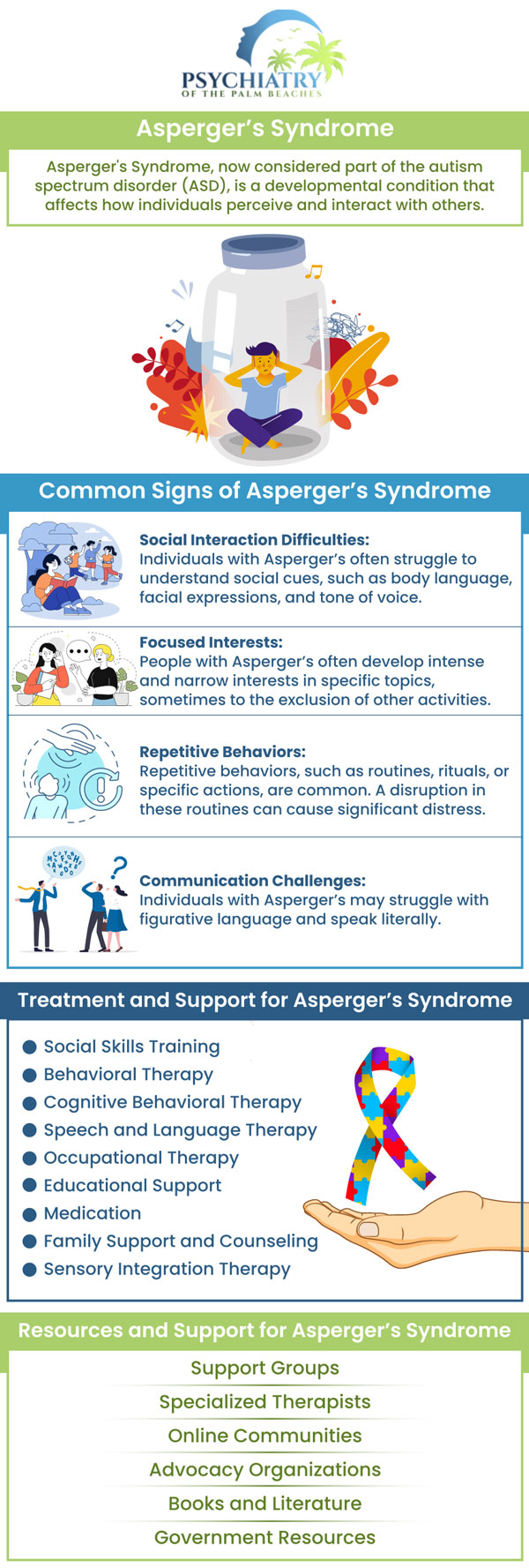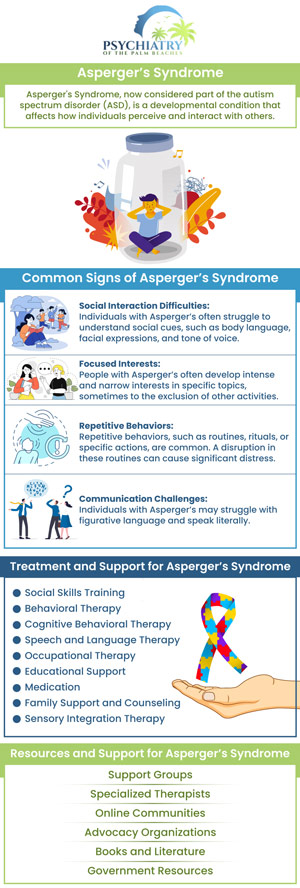Asperger’s Syndrome Treatment Q&A
Asperger’s syndrome is a neurological development disease. Asperger syndrome is often described as a high-functioning version of autism. It can cause problems interacting socially, repetitive behaviors, uncontrolled motions, and clumsiness. Common symptoms of Asperger’s syndrome include difficulty making eye contact, responding to conversations, comprehending body language, expressing a few emotions, and difficulty adjusting to change. If you feel you or a loved one may have Asperger’s syndrome, see medical professionals at Psychiatry of the Palm Beaches. For more information, contact us today or book an appointment online. Visit Psychiatry of the Palm Beaches serving Jacksonville, Boynton Beach, Palm Beach Gardens, Stuart, Royal Palm Beach, Port St. Lucie, Melbourne, Fort Lauderdale, and Jupiter, FL.




Table of Contents:
What is Asperger’s syndrome?
What are the main symptoms of Asperger’s?
Can someone with Asperger’s have a normal life?
How do you treat Asperger’s syndrome?
Asperger’s syndrome belongs to the broader developmental disorder category of autism spectrum disorder (ASD). This condition is commonly referred to as a high-functioning form of autism. While the symptoms of Asperger’s are typically prominent, they are often less severe than other kinds of ASD. Asperger’s makes it more difficult for people to relate to others and form social connections.
Doctors who can diagnose this condition include psychiatrists and developmental pediatricians. Asperger’s symptoms can be managed through a personalized approach. As each person is affected by this condition uniquely, the physician will take various elements into account. Cognitive behavioral therapy (CBT), social skills training, and parent or caregiver education are all components that can be incorporated into the treatment plan.
The symptoms of Asperger’s syndrome usually become apparent early in life. Most of the time, the condition can be diagnosed between the ages of 5 and 9; however, some people don’t get diagnosed until adulthood. Most of the symptoms of this condition are related to communication, emotional, and behavioral skills and include:
• Trouble making or maintaining eye contact.
• Trouble responding to or maintaining a conversation.
• Trouble picking up on social cues that others find obvious.
• Trouble interpreting others’ body language, facial expressions, and emotions.
• Exhibiting few emotions or having difficulty communicating about them.
• Speaking in a flat, monotone, or robotic tone.
• Having an intense passion for or interest in a specific topic, such as football stats or plants.
• Difficulty adjusting to change.
• Feeling best when sticking to a strict schedule.
Furthermore, certain symptoms of Asperger’s syndrome are more common in adults. These include:
• Hypersensitivity.
• Obsession with a particular topic.
• Difficulties or awkwardness in social settings.
• Clumsiness.
If you notice these symptoms, they could be indicative of Asperger’s syndrome. To receive a diagnosis, you should schedule an evaluation with a psychiatrist.
A majority of both children and adults who receive an Asperger’s syndrome diagnosis go on to lead successful and fulfilling lives. They still enjoy many of the same things that neurotypical people do and can learn to cope with symptoms through various therapies. Each person’s experience is unique, so while some individuals find that Asperger’s has little effect on their day-to-day lives, others observe a noticeable impact on daily tasks and interactions. While the majority of those diagnosed with Asperger’s live a normal and happy life, they are more likely to experience the following challenges:
• Overstimulation – People with Asperger’s syndrome tend to dislike loud noises, excessive visual input, and social pressure, as these elements can cause them to become anxious and overwhelmed.
• Difficulty at school – Education can become difficult if certain accommodations, such as a quiet learning environment or one-on-one support, are not available. To ensure your child’s success in school, it is crucial to communicate their diagnosis and the recommended accommodations to their school.
• Difficulty with relationships – Due to difficulties with communication and social cue interpretation, individuals with Asperger’s syndrome may have a harder time forming relationships with others.
• Feeling lonely or isolated – People with Asperger’s can feel lonely or isolated due to their symptoms. It’s encouraged to participate in treatment to understand the condition and how to manage the symptoms.
Psychiatrists work closely with individuals with Asperger’s syndrome to develop a treatment plan to meet their unique needs. In some cases, medications are prescribed to manage certain symptoms of Asperger’s. These include selective serotonin reuptake inhibitors (SSRIs), anti-psychotics, and attention deficit medications.
In addition, people with Asperger’s can work with psychiatrists, speech therapists, and occupational therapists to ensure their symptoms are effectively managed. If your child is diagnosed with Asperger’s syndrome, it’s crucial to support them by advocating for accommodations in learning environments and participating in family therapy to gain knowledge on helpful coping techniques.
Personalized Asperger’s Syndrome Treatment with Our Team
At Psychiatry of the Palm Beaches, our team provides personalized Asperger’s Syndrome treatment that focuses on addressing the unique challenges each individual faces. Our team’s approach includes a combination of therapy, coping skills development, and family involvement to help patients thrive in both personal and social situations.
Overall, while there is no cure for Asperger’s syndrome, the condition can be effectively managed with the help of a trained professional. The specialists at Psychiatry of the Palm Beaches are ready to support you with quality care. For more information, contact us today or book an appointment online. We serve patients from Boynton Beach FL, Delray Beach FL, Palm Beach Gardens FL, Jupiter FL, Stuart FL, Palm City FL, Royal Palm Beach FL, Wellington FL, Citrus Ridge FL, Jacksonville FL, Riverside FL, Port St. Lucie FL, Beau Rivage West FL, Melbourne FL, Palm Bay FL, Fort Lauderdale FL, Hollywood FL, Jupiter FL, North Palm Beach FL, and surrounding areas.
Check Out Our 5 Star Reviews



Additional Services You May Need
▸ Mental Wellness
▸ Relationship Coaching
▸ Depression and Mood Disorders
▸ Women’s Health
▸ Panic Disorder
▸ Medications Management
▸ Men’s Health
▸ Individual Psychotherapy
▸ Bipolar
▸ ADHD
▸ Geriatric Mental Health
▸ Couple’s Counseling
▸ Obsessive Compulsive Disorder
▸ Social Phobia Treatment
▸ Eating Disorders
▸ Post Traumatic Stress Disorder
▸ Psychotic Disorders


